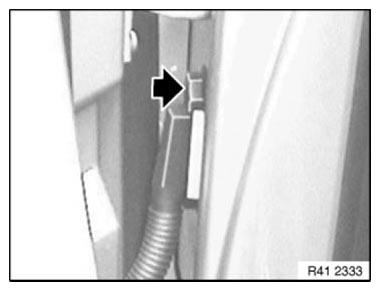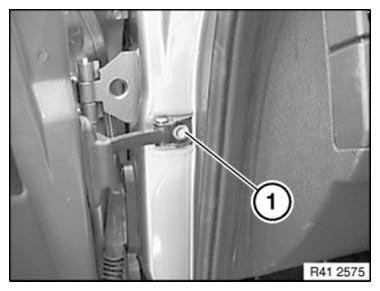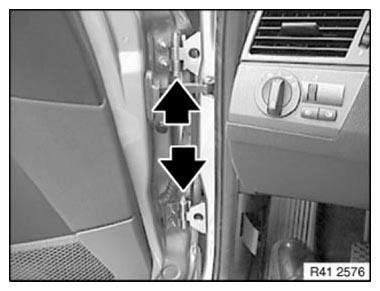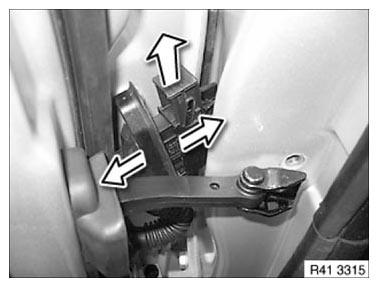BMW 7 Series: Removing And Installing Door
IMPORTANT: Do not damage adjoining body parts.
The illustrations are schematic representations and are to be applied to the
relevant vehicle type.
Open door.
Release screw on connector frame.
Front door: Tightening torque 41 51 4AZ.
Rear door: Tightening torque 41 52 4AZ.

Fig. 402: Locating Screw On Connector Frame
NOTE: Secure door against closing.
Release screw (1) on door retainer.
Front door: Tightening torque 51 21 3AZ.
Rear door: Tightening torque 51 22 3AZ.
Open door up to stop.

Fig. 403: Identifying Screw On Door Retainer
Release screws between both hinge elements at top and bottom.
Front door: Tightening torque 41 51 1AZ.
Rear door: Tightening torque 41 52 1AZ.

Fig. 404: Locating Hinge Elements
Pull plug connection from door pillar, unlock by pulling out bar and detach.
Unhinge door by moving upwards and placing it on a suitable surface.
Installation:
If necessary, adjust DOOR.

Fig. 405: Pulling Plug Connection From Door Pillar
READ NEXT:
The AFGS system consists of the following components:
Satellites (control unit + sensor)
Sensors, inside, bumper trim, left/middle/right
ACSM control unit (Crash Safety Module)
Cables and c
IMPORTANT: The BATTERY NEGATIVE LEAD must be clamped off on vehicles with
AFGS
active pedestrian protection!
Do not damage adjoining body components!
Minor corrections (realignment work) are permitte
SEE MORE:
Necessary preliminary tasks
Remove INSTRUMENT PANEL TRIM
Position of actuator drive:
OVERVIEW OF ACTUATOR DRIVES ON HEATER/AIR CONDITIONER
Release screws (1).
Take off holder (2).
Fig. 73: Identifying Holder And Screws
Unclip connector piece (1) and slide downwards.
Latching of connector piece
Notes
WARNING: Risk of injury!
Refrigerant circuit is under high pressure!
Follow safety instructions for handling R 134A refrigerant.
Avoid contact with refrigerant and refrigerant oil.
Follow safety instructions for handling REFRIGERANT OIL.
IMPORTANT: Observe SAFETY INSTRUCTIONS for raising the v





